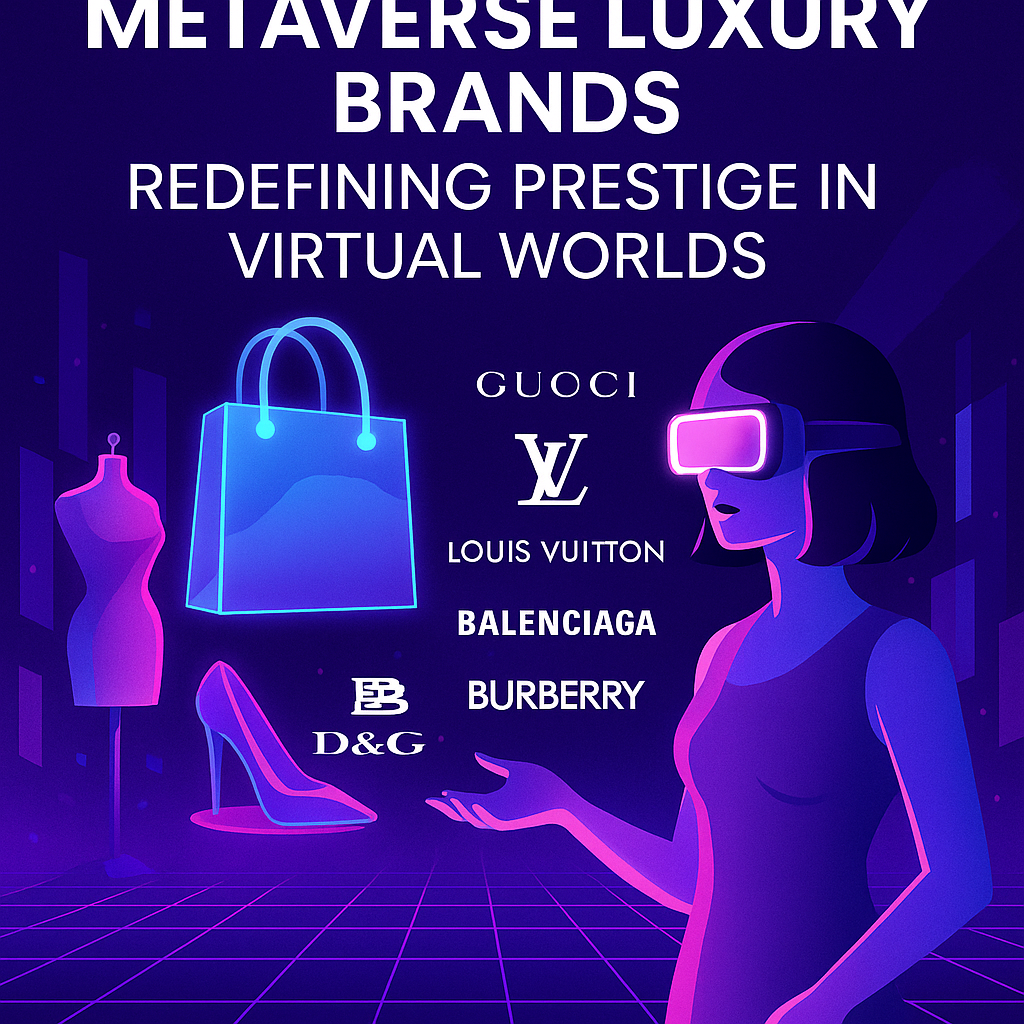Metaverse luxury brands are reshaping how fashion and status are perceived in the digital age. No longer limited to physical runways or storefronts, top luxury labels now build immersive virtual experiences. NFT drops, avatar wearables, virtual reality shows, and digital-only fashion lines.
The fusion of exclusivity, innovation, and interactivity has launched brands. Like Gucci, Louis Vuitton, Balenciaga, and Dolce & Gabbana into a new dimension. This isn’t a passing trend—it’s the future of premium branding and digital consumer experience.

Luxury Brands Leading in the Metaverse
Gucci’s Roblox Garden and Digital Wearables
Gucci pioneered metaverse fashion by launching Gucci Garden on Roblox—an interactive realm with limited-edition avatar accessories. This initiative led to Gucci Town, a permanent branded experience in Roblox combining mini-games, art galleries, and virtual fashion.
They also entered the NFT space with Vault, launching digital collectibles tied to physical perks, and collaborating with platforms like SuperRare to merge art and fashion.
Louis Vuitton’s Gaming Journey and NFT Integration
To celebrate its 200th anniversary, Louis Vuitton developed Louis The Game—a mobile game where players could unlock NFT artworks, including pieces by renowned digital artist Beeple.
They also made waves by designing in-game skins for League of Legends, blending couture with gaming and engaging Gen Z consumers directly within their digital habitat.
Balenciaga’s Fashion-Tech Crossover with Fortnite
Balenciaga set new standards by launching exclusive skins and virtual stores in Fortnite. Their collaboration with Epic Games not only made high fashion interactive but also inspired other brands to join the gaming space.
Their immersive virtual experience “Afterworld: The Age of Tomorrow,” built using Unreal Engine, presented their Autumn 2021 collection in a futuristic 3D environment, showcasing how storytelling and style converge in the metaverse.
Burberry and Gaming-Fashion Fusion
Burberry took a strategic leap with its collaboration in Blankos Block Party, releasing branded NFTs and in-game items like the limited-edition Sharky B figure.
The brand also experimented with AR-powered retail experiences and took part in Decentraland’s digital fashion showcases to stay relevant in the evolving virtual luxury ecosystem.
Dolce & Gabbana’s Digital-Physical Hybrids
Dolce & Gabbana launched the Collezione Genesi, a hybrid NFT drop combining physical haute couture with digital artwork. Items like the “Impossible Tiara” and “The Glass Suit” fetched nearly $6 million at auction.
The brand continues to explore the metaverse through partnerships with Decentraland Fashion Week, blending runway tradition with tech innovation.
Digital-First Fashion Brands Setting New Standards
Tribute Brand’s All-Digital Couture
Tribute Brand, established in 2020, is a digital-only fashion house that creates clothing solely for virtual wear. They’ve collaborated with luxury labels like Jean Paul Gaultier and launched virtual wardrobes that users can wear in AR and across metaverse platforms like Decentraland.
With NFC-linked apparel, the brand bridges physical and digital, allowing customers to own phygital pieces with embedded blockchain authentication.
DRESSX’s Scalable Virtual Wardrobe
DRESSX is the largest digital fashion retailer offering AR wearables and 3D clothing that can be styled on photos, avatars, or in-app environments. They’ve partnered with leading names like Dior, Balenciaga, and Off-White and have participated in Meta’s fashion week for virtual platforms.
According to Wikipedia, DRESSX is shaping how digital fashion will become a mainstream wardrobe extension.
How Metaverse Luxury Brands Engage Consumers
Virtual Stores and Fashion Shows
Brands are building flagship VR showrooms where users can browse, buy, and socialize. Balenciaga and Dior lead the charge with immersive VR events, offering front-row seats to metaverse fashion weeks and early access to NFT drops.
These showrooms offer storytelling, exclusivity, and seamless social integration.
NFTs and Blockchain-Based Collectibles
Scarcity and prestige are critical to luxury. NFTs let brands sell authenticated digital fashion pieces—like Louis Vuitton’s Beeple collectibles or Gucci’s SuperGucci drop—backed by verifiable blockchain ownership.
These digital items also unlock VIP experiences, like in-game access, physical rewards, or early product previews, creating multi-layered value.
Phygital Merges and Augmented Reality
Phygital strategies combine real-life fashion with digital counterparts. Examples include Tribute’s NFC garments and Dolce & Gabbana’s NFT couture.
Through AR and wearable tech, luxury brands can offer garments that exist both in your closet and your digital identity—accessible on platforms like Meta, Roblox, or Snapchat.
Why the Metaverse Matters to Luxury Fashion
Capturing Younger Audiences
Luxury brands target Gen Z and Gen Alpha, who value experience, identity, and personalization. Platforms like Roblox and Fortnite allow fashion houses to meet digital-native consumers in immersive, interactive environments.
A report by Boston Brand Media shows Gen Z engagement rises by 300% when fashion is gamified or linked to social avatars.
Innovation & Sustainability
Digital fashion significantly reduces waste, water use, and carbon emissions. Designers like Scarlett Yang are exploring biodegradable materials and digital-first prototypes, advancing sustainability in both physical and virtual fashion.
As Wired highlights, tech-powered fashion may become one of the industry’s most sustainable evolutions.
Building Communities Through Experience
With platforms like Decentraland and Spatial, luxury houses can own land, host concerts, preview collections, and sell exclusive content—all in one branded metaverse hub. Philipp Plein invested over $1.4 million in Decentraland to build Plein Plaza, a virtual fashion district and art gallery.
This level of immersive ownership helps brands go beyond sales to build lasting, community-first loyalty.
The Future of Metaverse Luxury Brands
- Hyper-personalized AI fashion: Using AI to customize virtual outfits based on biometric or behavioral data.
- VR-first shopping: Virtual boutiques with try-on capabilities powered by avatars and haptics.
- Digital twins for authentication: Physical fashion backed by digital NFTs for traceable ownership.
- Token-gated exclusivity: VIP experiences and access controlled by blockchain smart contracts.
- Global fashion weeks in the metaverse: Replacing physical runway shows with immersive Web3 catwalks.
Final Thoughts
Metaverse luxury brands are more than fashion statements—they’re cultural blueprints for how identity, exclusivity, and creativity will be expressed in the digital era.
As the real and virtual worlds continue to blur, these luxury leaders are building timeless appeal through innovation, storytelling, and immersive technology. In doing so, they redefine what it means to be fashionable—not just in appearance, but in experience, purpose, and presence.
